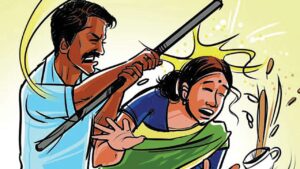—by Kankabati Dutta
–Reading Time – 17 min Approx
June stopped suddenly, while walking side by side with Tomajit, or Tom as she called him.
 “I have an eerie feeling, someone is stalking me”, she said.
“I have an eerie feeling, someone is stalking me”, she said.
“Stalking you?”, asked Tom, as he stopped midway, too. “Who can it be?”
June shrugged, “I’m not sure who it might be. It might even be several persons, not just one man. Didn’t you see the black car in the shadows of the cluster of trees near the main entrance of the condominium housing estate?”
Such were the moments when entrepreneur Jonardan or John Bose’s daughter June felt the absence of her father most intensely. Raised in the lap of luxury, he had guided her to be upright and unafraid to voice her opinions from her very childhood. From being part of an ambience which witnessed the success of one after the other of her father’s enterprises, their fleet of expensive cars, luxurious mansions owned by their family, the grand parties at their palatial house attended by the most powerful and famous of the land, things had changed drastically for June and her mother ever since the first income tax raid in their house ravaged their entire establishment and John-Jonardan Roy absconded to avoid facing charges till he could consult a legal counsel properly since most of the charges were almost groundless.
Tom reached out to hold her hand, “I did notice it, June. But don’t worry”.
“How can I help being anxious, Tom? Particularly so for Mom, who’s all alone now”.
Tom took June’s hand in his palm, “I’ll handle the matter. Mom will be fine”. He was about to say something more, when it started drizzling. Hand in hand, both of them ran towards the portico of Jonardan Bose’s palatial mansion to take shelter from the rain.
It seemed to be the onset of monsoon, or Varsha, as the rainy season, which descended on most of India in mid June was called, filling dried up river beds, moistening parched soil, all cracked up in the unbearable heat of the tropical summer.
It was villages which comprised most of India, with several metropolitan cities and some towns dotting the subcontinent. Although farmers eagerly awaited the lashing rains on account of their crops, as well as the entire communities, who sought relief from the terrible summer heat, every year monsoon brought with it the danger, catastrophe, tragedy of raging floods destroying homes and lives, year after year.
One could not help wondering why this disaster could not be handled properly by the governments which came to power after every election, with each party proclaiming great improvement in administration if they were voted for, but none kept their word.
“I can hardly tear myself away from the window when it rains like this …”
June loved rain. The sound of raindrops falling on the leaves of trees and on the roof often lulled her to a peaceful sleep, so relaxing was it to her. The smell of the freshly rain drenched earth evoked a strange nostalgia, as if wafting from another birth, another forgotten life. The very sight of the heavy, forceful rain unique the Indian monsoon often interspersed and crowned with overwhelmingly thunderous flashes of lighting enchanted her. The Nobel winning poet of Bengal Rabindranath Tagore had described this lighting as, “The Sparkle of God’s Diamond Studded Sword”.
June was heard saying one day, with a sigh, while studying at her desk before her final examinations. The maid servant who was cleaning and dusting her study smiled. “I know you love to gaze at the drizzling rain, Didi (Bengali for sister). But think how troublesome it is for us poor folk when we have to rough it out walking through the sloshy waterlogged streets filled with germs from the overflowing drains”.
 June turned around to look the maid in the eye. It had been for many years now that the girl was working in their house as a domestic help. Initially she had come down with her mother, who had fled their village because of an abusive husband. The man used to come home drunk and beat mother and child up brutally. Wife beating was still common in the villages of India. No one batted an eye lid, neither did the police take much action when a woman died in the hands of a murderous husband. Unless heavily bribed, the police would hardly budge, more often than not.
June turned around to look the maid in the eye. It had been for many years now that the girl was working in their house as a domestic help. Initially she had come down with her mother, who had fled their village because of an abusive husband. The man used to come home drunk and beat mother and child up brutally. Wife beating was still common in the villages of India. No one batted an eye lid, neither did the police take much action when a woman died in the hands of a murderous husband. Unless heavily bribed, the police would hardly budge, more often than not.
This young maid servant was quite pretty albeit, with a weird rustic Bengali name when she came from the village. June had sort of rechristened her by changing her name to Lisa. Single children were often lonely. Lisa became June’s doll to play with, when she was a little girl, a much-needed companion. Incidentally, it was after a toy doll given to June by her father than June had named Lisa.  The doll seemed to have come alive in the form of a living playmate. No toy is as good as a live human being of flesh and blood at one’s side. No toy evokes as much emotion, be it even anger, irritation, or annoyance, not to speak of the pleasure of laughter triggered by sharing communication with a real person. Yet how easily human beings are wiped off from the face of the earth in political encounters and other killings in trouble ridden India. The horror of gang rapes, lynching, religious riots had become common. Elections had become a farce whereby people were forced to vote either at gunpoint or in exchange of bribes. June remembered her father saying, whereas almost all modern philosophers had questioned religious strife, condemning conflict triggered by hatred between different religions, it was a pity that the spectra of religion had loomed even larger in twenty first century India. The two largest communities were of the religions of Hinduism and Islam, called Hindus and Muslims who were at dagger’s end in hatred.
The doll seemed to have come alive in the form of a living playmate. No toy is as good as a live human being of flesh and blood at one’s side. No toy evokes as much emotion, be it even anger, irritation, or annoyance, not to speak of the pleasure of laughter triggered by sharing communication with a real person. Yet how easily human beings are wiped off from the face of the earth in political encounters and other killings in trouble ridden India. The horror of gang rapes, lynching, religious riots had become common. Elections had become a farce whereby people were forced to vote either at gunpoint or in exchange of bribes. June remembered her father saying, whereas almost all modern philosophers had questioned religious strife, condemning conflict triggered by hatred between different religions, it was a pity that the spectra of religion had loomed even larger in twenty first century India. The two largest communities were of the religions of Hinduism and Islam, called Hindus and Muslims who were at dagger’s end in hatred.
“It’s fine with you, Didi, to sit inside a plush air-conditioned room, and gaze at the falling rain from within its secure comfort, abandoning your mood to romantic, lyricism! but think of the terrible ordeal we poor folk have to go through, during the showers” Lisa had once told June in the face in answer to the comment expressing how June loved to watch the rain. The way Lisa had reacted was so sharp, well-articulated with excellent vocabulary that the words had hit June like a light slap.
A bit embarrassed, she nodded, “I know, Lisa, your mother had slipped several times on the slushy roads, and the leaking roof of your room was posing a big problem”.

“But your father, John Sir had repaired it for us”, said Lisa excitedly, her face was glowing.
June’s father had no communal inhibitions, and the people he hired for his organizations and as his household domestic helps were from all communities, whether Hindus, Muslims, Christians, Sikhs, Buddhists. Yet the present government in India was openly anti-Islam, creating organized discard between the Hindus and Muslims. There had been sudden communal riots in the capital city of Delhi, and all over the country. Whereas the great writers and philosophers of India had always preached unity, communion, and peace between the religion, bringing communal harmony, the news regime suddenly fanned the sparks of hatred.
There had been occasions on which Jonardan Bose had been criticized for this stand of his by local ruffians who claimed that priority should be given to the son of the soil as far as employment was concerned, since jobs were hard to come by, particularly in the new regime which had come to power by playing on religious superstitions, strife, and inhibitions of the masses. Now that June came to think of it, the tragedy that had befallen them had been brewing for many reasons, from different angles. Her father Jonardan Bose, known as John by one and all was a talented and innovative creator, of brands too bold and courageous to pay any heed or attention to these disturbances or threats. Rather challenge was like a game which attracted him.
As June and Tom ran towards the house in the rain, the housekeeper of the Rays.
Appeared like a shadow in the doorway, squeezing himself behind the majestic pillar which Janardan had once commissioned a French architect to design alongside an Indian mural artist.
 “June Didi, Tom Da”, he lisped, his voice falling to a hardly audible whisper, Didi and Dada stood for sister and brother in his local language, used commonly to address people respectfully.
“June Didi, Tom Da”, he lisped, his voice falling to a hardly audible whisper, Didi and Dada stood for sister and brother in his local language, used commonly to address people respectfully.
“Hey Robi, Rob, why are you shivering like that?”
To this question of Tom’s, the longtime family loyalist answered in a very low tone. “The plain clothes police have already entered the house through the garage side back entrance”.
“What!”, shreiked June, aghast.
“Shhh! Speak softly June Didi”.
“They are looking for photographs of Sir. They have little idea what he looked like, since he always shunned publicity, as well as being a bit camera shy”.
“Hmmm”, nodded June, “Don’t I know that ! He even disliked having his photos framed and put up on our walls as part of interior decoration”.
Tom panicked. “Let’s get out of here right now”, he said, “The police will be here any moment”.
“Wait”, said June, “There are some pictures of Dad on my bed side table and in between the pages of a book I was reading. I must remove them right away”.
“Right”, said Rob. If they have no clue what he looked like it will be difficult for them to trace him. He is not using his mobile either. So there is no way to track whereabouts down through the mobile towers.
June turned, towards him. “I’ll remove the photos in a jiffy. I’ll be right back!”
“No, no June, don’t you go. You’ll get caught”, panted Tom. “Let’s get out of here!”
June went ahead. “I must remove my Dad’s photos before they get hold of them. I’ll be right back, Tom”, She said as she pressed his hand.
Tom clasped her beautiful ringed fingers tipped with shell pink nail polish.
“You never know what they might do. They might confront you or hold you back for interrogation”.
June shrugged, “I’ve no way out. It’s my duty towards my father”.
Tom looked into her eyes helplessly, “I can’t leave you alone in this situation. I’ll go with you”.
“No, no, no need to come. I’ll be back in a minute”, as June said this, Tom felt he could hear hushed voices in the background.
He shrugged around, “I’ll wait here, then, whatever the consequence may be”.
—by Kankabati Dutta
To be continued…


